Miles for Miles
Athletic trainer honors late son in Ironman triathlon
March 25, 2021
Editor’s note: This story won first place for feature stories in the 2021 National Scholastic Press Association individual awards competition.
Aug. 2, 2015: Morning of the race
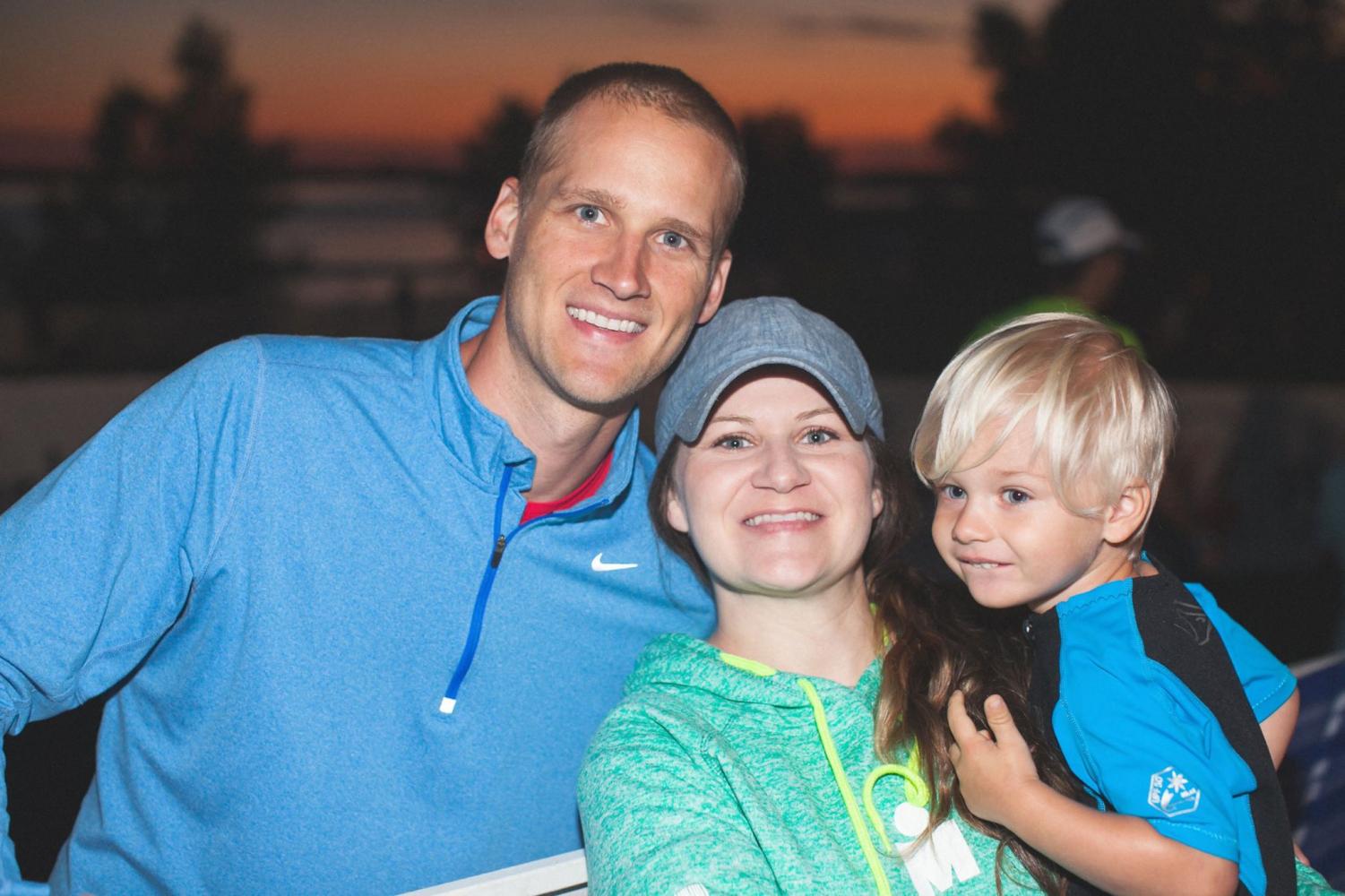
Athletic trainer Cade Ogilvie woke up at 4 a.m. for the Ironman triathlon in Boulder, Colorado.
He had toast with peanut butter and a banana for breakfast.
He packed and unpacked his bag to make sure he had everything — armband? Check. Tracking chip? Check. Running shoes, cycling cleats, wetsuit? Triple check.
He loaded his bike onto the car before driving to the race with his pregnant wife, Brooke, and their young son, Madden. His siblings, parents and friend were going to be there as well.
When they arrived, they were greeted by 3,000 people who were crazy enough to compete in the Ironman. Consisting of a 2.4 mile swim, a 112 mile bike ride and a 26.2 mile run in 17 hours or less, it is one of the hardest one-day sports events in the world.
While a few world-class athletes compete to win, most just hope to finish. In Boulder, Cade said about 1,000 people didn’t make it.
“It is one of the most taxing things I think you can do, not only physically, but mentally,” Cade said.
The athletes were all there for different reasons — to push their limits, to prove a point to their gym buddies, to finish first. But Cade was there because of what happened on May 25, 2014.
The day he lost his son, Miles Lon Ogilvie, who passed away at only 2 months and 8 days old.
Oct. 31, 2013: Diagnosis
As an athletic trainer, Cade knows all about the human body and what happens when it fails. But when he was working at a football game on Halloween 2013, he wasn’t thinking about the athletes’ sprained ankles and concussions. Cade’s mind kept wandering back to his baby.
That was a hard time, trying to deal with ‘What do we do?’
— Cade Ogilvie, Athletic Trainer
An earlier ultrasound showed abnormal results, so before the game Cade sat through a two-hour sonogram with Brooke, who was 20 weeks pregnant with Miles. He was now waiting to hear the results.
“I helped the athletes,” Cade said. “I was there for them without letting them see what was really going on, but that was a hard game to work.”
After the game, Brooke told him that Miles had a rare heart defect called hypoplastic left heart syndrome, meaning the left side of his heart didn’t develop. He also had heterotaxy, a condition that caused his organs to be on the wrong side of his body.
Although Cade understood the anatomy behind it, the future was unknown, which is what scared him the most.
“That was a hard time, trying to deal with ‘What do we do?’” Cade said. “You find out about these conditions, and then the more you try to research on your own, the more bad news you hear on the internet.”
Aug. 2, 2015: Starting the race
Cade loved the thrill of a race before he knew what a triathlon was. Motivated by constant competition with his brother, Jason, Cade grew up playing almost every sport imaginable and continued exercising well past college.
After seven months of training, Cade stood among the 3,000 other athletes, anxiously waiting for the race to start at 7 a.m. Cade was in one of the first groups.
Suddenly, the sound of a cannon exploded, signaling the start. The first athletes ran towards the reservoir, and it wasn’t long until it was Cade’s turn.
With 140.6 miles ahead of him, Cade took his first step towards becoming an Ironman.
March 17, 2014: Meeting Miles
Brooke and Cade had a 22-month-old son, so the delivery room wasn’t foreign to them when Miles was born on St. Patrick’s Day. But nothing else was the same.
Miles’ skin was deep blue and Brooke didn’t get to hold him immediately. Instead, he was quickly moved to the neonatal ICU for tests while Cade followed.
“They cut the umbilical cord, they put him under this lamp, they do all this stuff, and then they take him away,” Cade said. “So you just feel empty.”
Cade went to see his family in the waiting room.
“Once I saw my dad and my mom, I just lost it,” Cade said. “Broke down. I just couldn’t handle it.”
Brooke and Cade held Miles for the first time when he was two days old. The world was still asleep at 5 a.m. and he would be having his first heart surgery in an hour, but getting to touch more than his thumb was special.
“It’s just kind of like the calm before the storm,” Brooke said. “You know what’s about to happen to him, so that’s hard, but it’s really sweet. That’s definitely a moment I remember very vividly.”
When you’re a dad, you just want to be able to help your kids become these great men, and there’s nothing that I could do that was helping my son at that point. — Cade Ogilvie, Athletic Trainer
Brooke and Cade stayed in the hospital for a week, then they took turns with Miles in the cardiac unit.
Every day seemed to bring a new accomplishment to celebrate — getting off a certain medication, requiring one less tube. The nurses called Miles “Super Baby.”
But on the seventh day, Brooke and Cade almost lost their newborn.
“When you’re a dad, you just want to be able to help your kids become these great men, and there’s nothing that I could do that was helping my son at that point,” Cade said. “Having to take a backseat to that and have somebody else step in was hard for me.”
Brooke was at the vending machine when she heard the nurses call code blue for Miles. She then got a text from Cade.
Don’t come back.
“I think he was just trying to protect me from not going in, but I was like, ‘No, I’m definitely going,’” Brooke said. ‘“I don’t care. I need to know what’s going on.’”
The doctors came in and out of the room for about 30 minutes, updating Brooke and Cade constantly. With each piece of news, they relaxed — the doctors were able to save their baby.
However, the fragility of Miles’ condition suddenly seemed all too real.
“I think for us, that was a reality of ‘We really aren’t in control here,’” Brooke said. “He could pass away.”
Aug. 2, 2015: Swimming
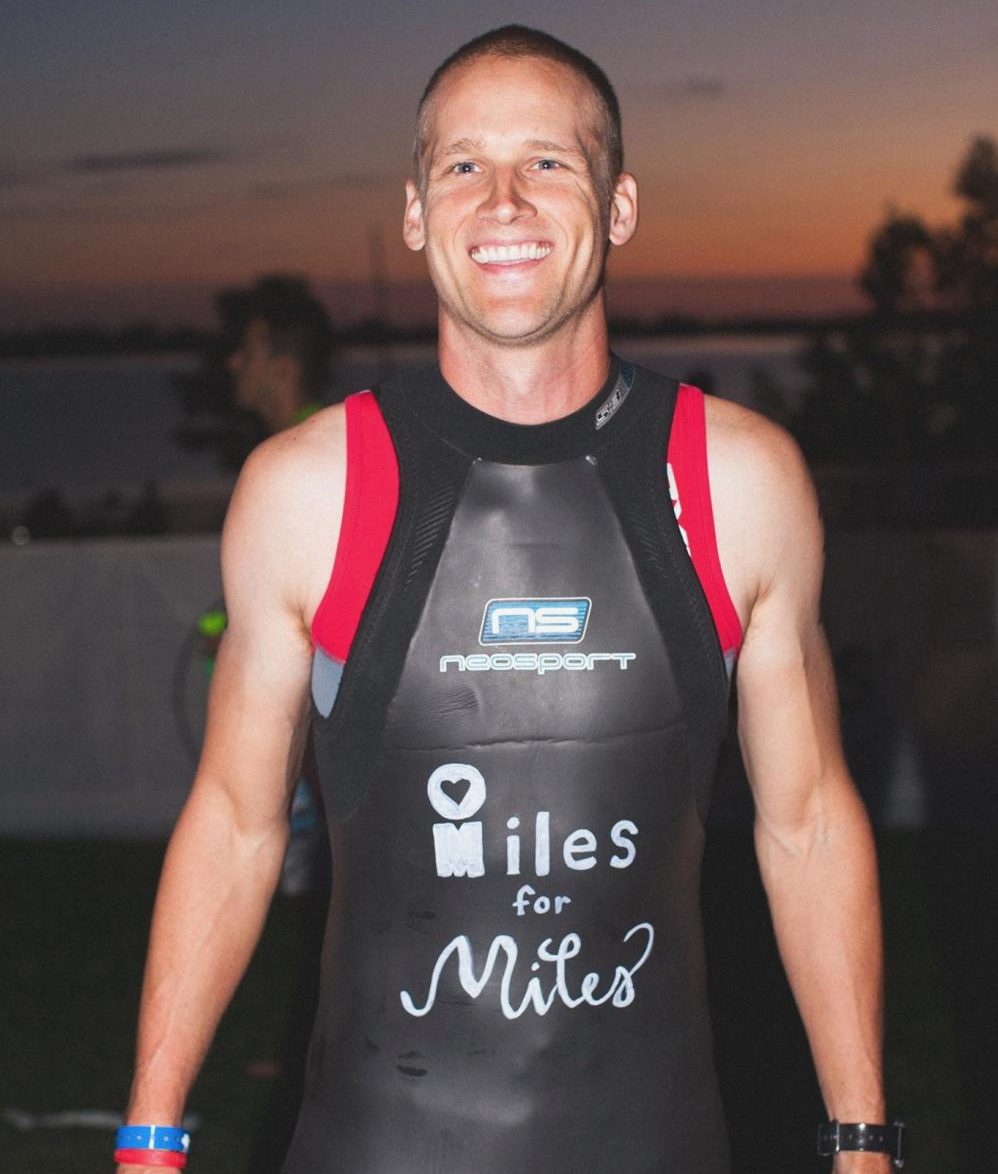
Cade dove into the cold water among hundreds of other swimmers. It was like a jam-packed highway, with everyone pushing to reach the shore without crashing into each other.
“It’s just a really neat experience to try to get in the water with 2,000 other people and try to swim,” Cade said. “You get kicked in the face, your goggles come up, you got to stop, you got to orient yourself and you got to somehow keep going.”
As the swimmers moved across the reservoir as one, something about Cade stood out. His wetsuit wasn’t plain black.
Cade and Jason had worked together the night before to write “Miles for Miles” across the front. They also drew a special Ironman logo, created specifically to represent Miles. They wanted it to be perfect to remind Cade why he was there.
“It just seems so funny for two grown men to doodle this little logo on a wetsuit, but it was heartwarming,” Brooke said.
April 21, 2014: Going home
After 35 days in the hospital, Miles was finally able to go home. Brooke and Cade knew taking on Miles’ extensive medical care would be an uphill battle, but they were excited to be together as a family. Madden immediately fell in love with Miles, who he called Bubba.
“He’s like the perfect big brother for what we’ve gone through,” Cade said. “He was great. He was always very gentle, not playing too hard around him, and he would always just give him kisses.”
After Miles came home, Madden slept on the floor so he could peer through the crack under his door when he heard his parents in the middle of the night with Miles.
When [Miles] would look at you, it was like he was looking at you through your soul or something.
— Brooke Ogilvie
“If he would hear Miles cry, he’d be like, ‘Oh, Bubba crying,’” Brooke said. “Or if he heard us, anything with him, he would, ‘Oh, Bubba diaper change.’”
Miles required 24/7 monitoring, so they took turns with him through the night. Their newborn would be too hot or too cold. He had to constantly be fed through his G-tube. And just as everything was finished, his IV machine would go off, so they’d have to give him medicine. They barely slept.
But even with the exhaustion, the quiet moments in the middle of the night were some of the times Brooke felt closest to Miles. He was always cold to the touch, so she’d often rest his cheek against her warm one. It’s a feeling she’ll never forget, just like the way he stared at her during those times.
“He had very soulful eyes,” Brooke said. “People have said that too looking at his picture. When he would look at you, it was like he was looking at you through your soul or something.”
Aug. 2, 2015: Biking
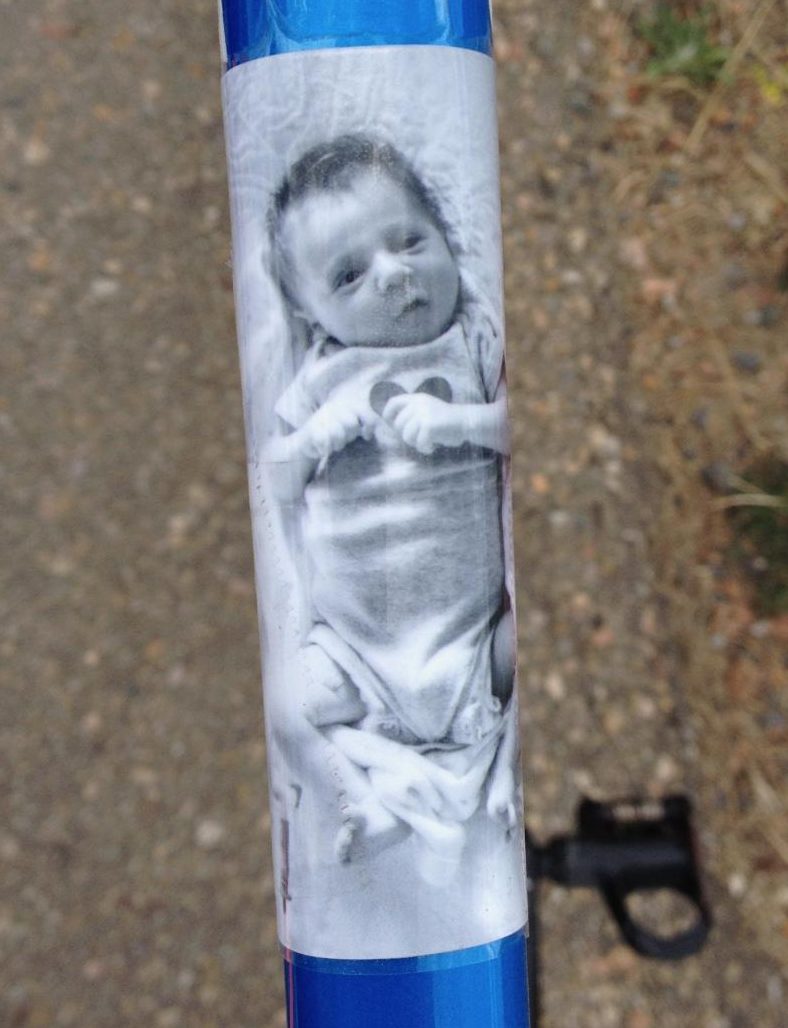
Cade mounted his bike to begin the 112 mile ride. The two-loop course went through Boulder and other neighboring towns at the base of the mountains.
“It was really pretty cool because they didn’t shut the towns down, but people were set up in lawn chairs along the road to cheer you on in kind of key spots,” Cade said.
Brooke watched with pride as Cade flew through the race. With pumping adrenaline and muscle memory from years of athletics, the difficulty of the race hadn’t hit Cade yet.
“He seemed determined and focused and fine,” Brooke said. “I mean, he would smile at us, wave. He did not seem like he was in distress.”
But towards the end, the course got hilly, and for the first time, Cade began to struggle. Even though the thought of still doing a full marathon would make most people sick at that point, Cade refused to give up.
Because when he hung his head, Cade locked eyes with Miles.
“I taped a picture of him on my bike frame so that anytime I was feeling down and looking down at my bike, it would remind me to keep going,” Cade said.
May 25, 2014: Miles’ last day
Exactly 34 days after coming home, Brooke decided to go on a run while Cade stayed with Miles. By the time she got back, Cade knew something was wrong with Miles’ breathing.
They quickly called 911. Brooke rode in the ambulance with Miles, while Cade drove behind them.
“When I walked in, I saw people freaking out and working on somebody in a room, and I didn’t want to believe that was my kid,” Cade said. “But I could tell.”
After waiting for what felt like forever, the doctor told them they couldn’t save Miles. Cade felt the doctor’s words all the way down to his bones.
“I’ve never felt like that, not being able to control my body,” Cade said. “I was cold. I was hot. I had goosebumps. Just nothing was working right.”
In the weeks that followed, depression settled in. Cade did nothing and everything at the same time to occupy his mind, even building a full deck in their backyard.
I wanted to suffer physically and mentally for one day, so maybe I could get a glimpse of what [Miles] was going through for his 69 days here on Earth.
— Cade Ogilvie, Athletic Trainer
“I’m a pretty positive person, but that was a hard time to do anything,” Cade said. “I tried to distract myself with projects and things… but it doesn’t ever really help. It just puts off the grief or a little bit longer.”
Slowly, everything that they used to help Miles for the past five weeks was taken out of the house.
“I remember them coming to pick up the IV machine and that was hard because that was like an extension of him, it felt like,” Brooke said. “And then the medical equipment kind of went away and you have this room, you have this nursery, you have all these things set up, and they’re just gone. The world does not make sense in that moment.”
As Cade was coping with this loss, it took a few months before he returned to working out.
“Exercise has always been a good release for me,” Cade said. “A way to kind of clear my head, and I think about a lot of stuff when I run or bike.”
Almost immediately, Cade knew he wanted to do the Ironman. He had been thinking about doing one for years and even ran a half Ironman before, but after competing, he couldn’t imagine doing a full one. It would be too difficult.
But after losing Miles, he didn’t care how painful the Ironman would be. In fact, Cade wanted it to hurt.
“I wanted to suffer physically and mentally for one day, so maybe I could get a glimpse of what [Miles] was going through for his 69 days here on Earth,” Cade said.
So, three months after losing his son, Cade registered for the Ironman, which would take place on Aug. 2, 2015. He also signed up to fundraise for the Children’s Heart Foundation and ultimately raised $3,000.
“Friends and family and people that just hear your story and donate, it’s kind of eye opening at how generous people can be,” Cade said.
Cade started running, swimming and biking regularly on Jan. 1, 2015, and he trained for a minimum of two hours almost daily. During the week, he woke up at 5 a.m. to run or bike before work, then swam during his lunch break. He ran and biked longer distances over the weekend.
“I thought about [Miles] every time I did a swim, a bike, a run, anything,” Cade said.
This went on for months, increasing in intensity as the race got closer.
“It was difficult to do, but I knew what my end goal was, and I knew I had to do these things to get there,” Cade said.
The training eventually took a toll on Cade. Being an athletic trainer meant he had the resources and the knowledge to combat general soreness, but when he developed a stress fracture in his left leg in mid-June, there wasn’t an easy fix.
I thought about [Miles] every time I did a swim, a bike, a run, anything.
— Cade Ogilvie, Athletic Trainer
The race was less than two months away, but the pain in his shin made it hard to walk, much less run. Cade was going on runs as long as 16 miles at that point, but it became clear that those days were over if he wanted his leg to heal in time for the Ironman.
Although a stress fracture mere weeks before a big race would seem like a nightmare for most athletes, Cade wasn’t worried. He knew that his marathon training would carry over on the day of the race. Until then, he adapted his plans, cycling his legs in a running motion in the pool for hours.
Beyond that, Cade barely thought about his injury. In his mind, a stress fracture paled in comparison to what Miles went through. If crossing the finish line meant he had to grit his teeth and run through the pain, so be it.
“I knew once I got to the run, I didn’t care if my leg just hurt and was painful,” Cade said. “I knew I was going to finish the race.”
Aug. 2, 2015: Running
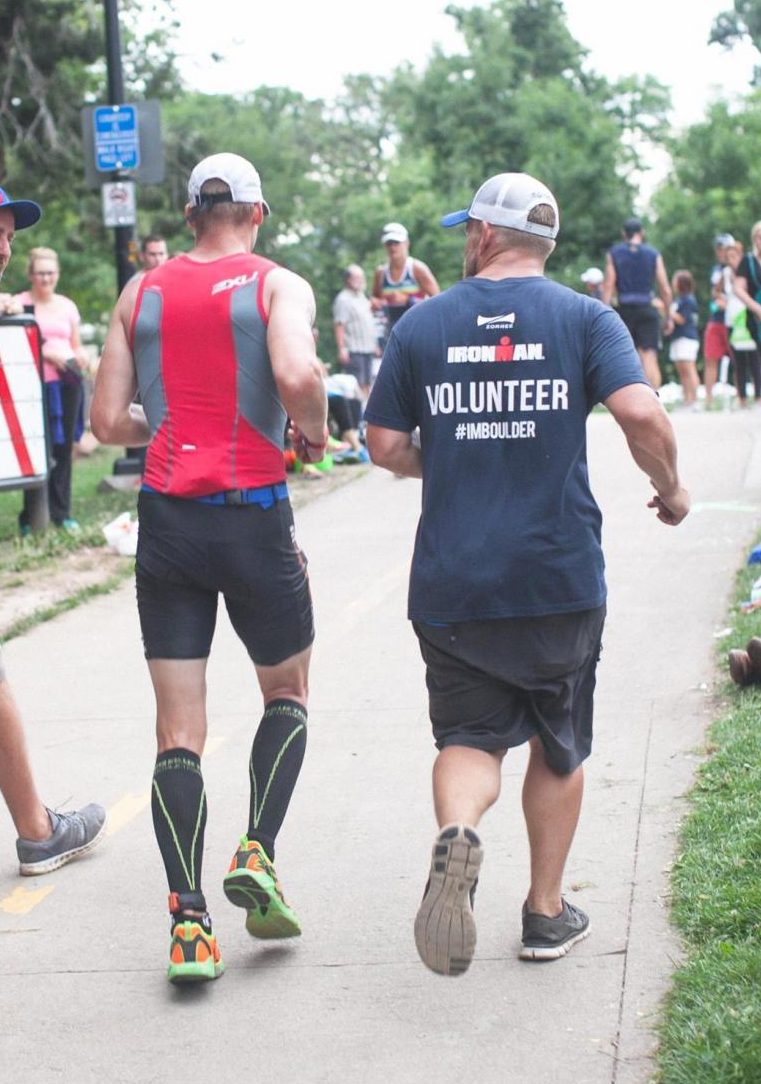
After Cade finished the 112 mile bike ride, he was too tired to change into his running shoes, but a full marathon still stood between him and the finish line.
“After everything that you’ve been through that morning, that’s the only thing you got left, and so I think a big thing of it is, you got to tell yourself positive thoughts,” Cade said.
Cade asked someone to help him change his shoes before putting on a beaded necklace he packed earlier. It was given to Miles through the hospital’s program, Beads of Courage. For every step in his treatment, such as a surgery, Miles got a new bead.
Now, Cade needed some of that courage to get him through the race. So, with Miles around his neck and in his heart, Cade started running.
“I think we all want to make Miles’ life meaningful, and I think this was Cade’s way of doing that,” Brooke said. “When you lose a child, there’s just a part of you that you lose, and I think you want the name of your child to carry on.”
Cade felt good for the first half, but once he got to mile 14, he felt like he hit a wall.
“My vision was narrowing,” Cade said. “It was super blurry.”
Cade walked for the next four miles. The reality of how difficult the Ironman is settled in for both Cade and Brooke, who watched from the side. She had never seen him this fatigued before.
“Just seeing him like that, that made it more real for me,” Brooke said. “… Cade is always mentally tough, so even if he’s having struggles or he’s having a hard time, he doesn’t really voice that very much.”
Cade’s brother, Jason, who was volunteering at the race, saw it too. He ran onto the course and fell in stride next to him. This motivated Cade; It was like they were kids again, racing from the grocery store to the car.
Cade picked up his pace, and Jason — the man who was by his side when they fought as kids, and when Miles was born and died decades later — did the same.
“Just having him at the race was pretty awesome, especially because he knew everything that I did that race for,” Cade said.
They stayed that way until the last mile, which Cade had to run alone. He could already hear the crowd cheering at the finish line. He pushed forwards, until finally, he made it.
“Hundreds, maybe thousands, of people in downtown Boulder just line the streets, watching you cross the finish line,” Cade said. “[It was] unreal, very exciting.”
Cade had finished an Ironman, but he didn’t think about the countless miles he trained or the 140.6 miles of the race. To Cade, the word wasn’t about distance. It was his son’s name, which would carry on.
“I do know that I’ll always have him with me,” Cade said.
After the race
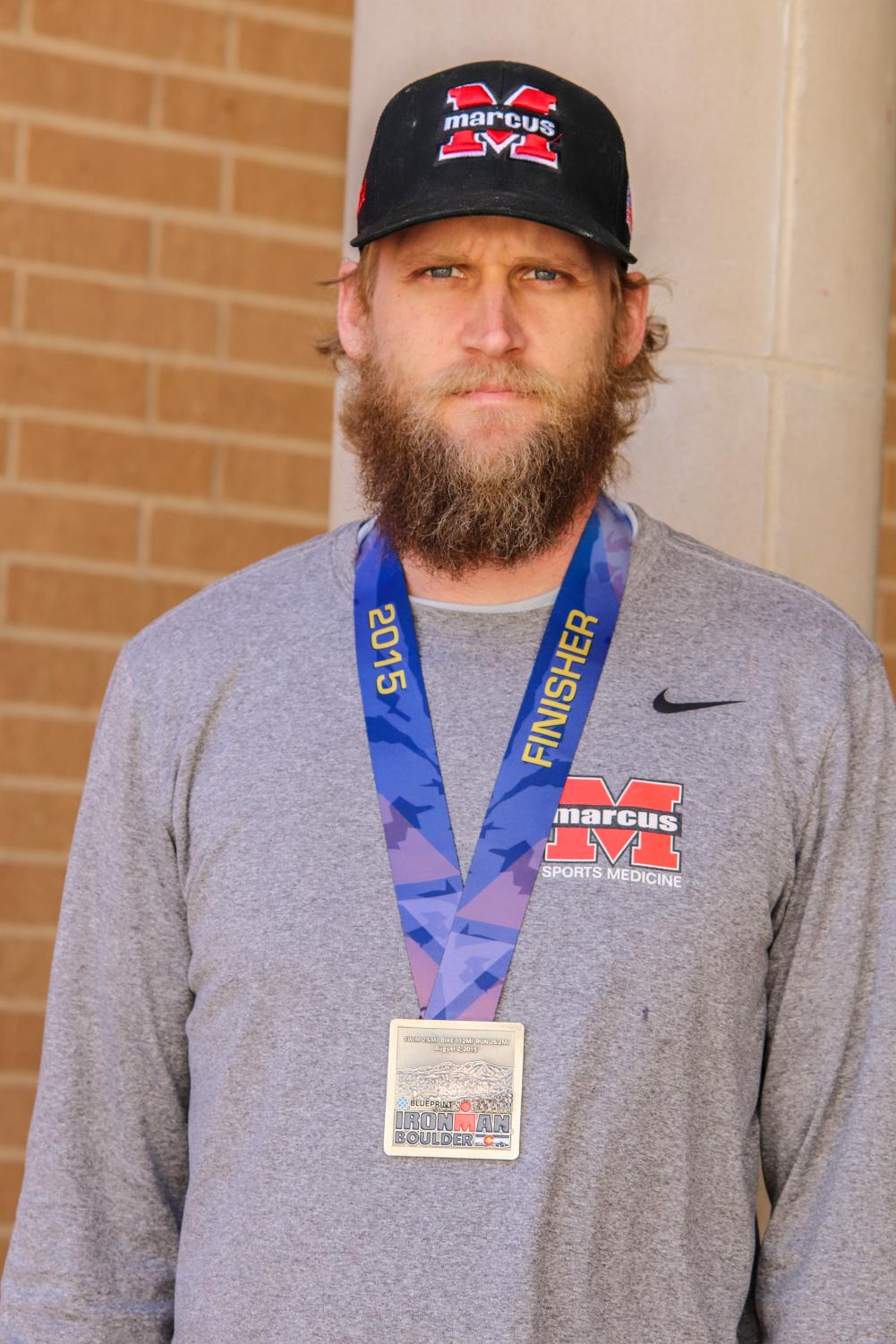
Cade doesn’t know if he’ll ever do another Ironman, but he and his family find other ways to honor Miles. They celebrate his birthday by visiting his grave and doing a random act of kindness.
“We just strive to live the best life we can with our kids that are here and spreading love, spreading compassion, spreading empathy to people that are hurting or have been in similar situations as us,” Brooke said.
The Ironman tattoo on Cade’s right calf, which includes a heart, and the red Children’s Heart Foundation bracelet that Cade has worn for the past seven years after he signed up to fundraise are daily reminders of their son, as is the song “Oceans” by Hillsong UNITED, which they often played when Brooke was pregnant.
“There’s always little moments that are surprises that just kind of bring me back,” Brooke said. “… Some of them are God winks.”
Miles’ memory is also kept alive by Madden and his little brother Major, who was born shortly after the Ironman. Madden was only a toddler when Miles died, but he remembers his baby brother and often talks about him. Two years ago, he wanted to share his favorite cookies with Miles, so he taped two vanilla wafers to a balloon and released it outside.
“For Madden to remember those things, it means everything,” Brooke said.
Cade said that no matter what the future holds, he’ll never forget everything Miles and the race taught him — to challenge himself, cherish the present and keep perspective on what truly matters.
“It was very, very cool to become an Ironman, and the purpose behind it,” Cade said. “I was just so happy. The people there were so happy for me. It’s just a great way to honor my son.”

Taneesha herndon • Feb 26, 2024 at 10:49 am
Thank you for sharing Miles story! Praying for you and your family!
Doug Bowling • Apr 12, 2021 at 10:29 am
Dear Madi,
I thought your article “Miles for Miles” so well written that at one point it made my eyes water. Heartfelt story of a tremendously difficult time for the Ogilvie family. Cade’s sister in law works with me and showed me the article. We are both in the Pediatric medical field.
Yours, Doug Bowling